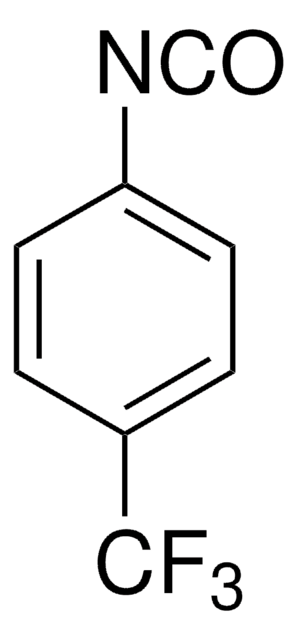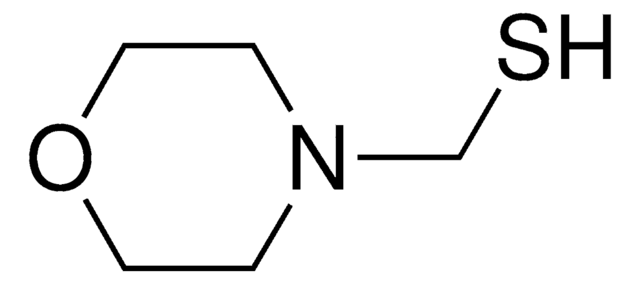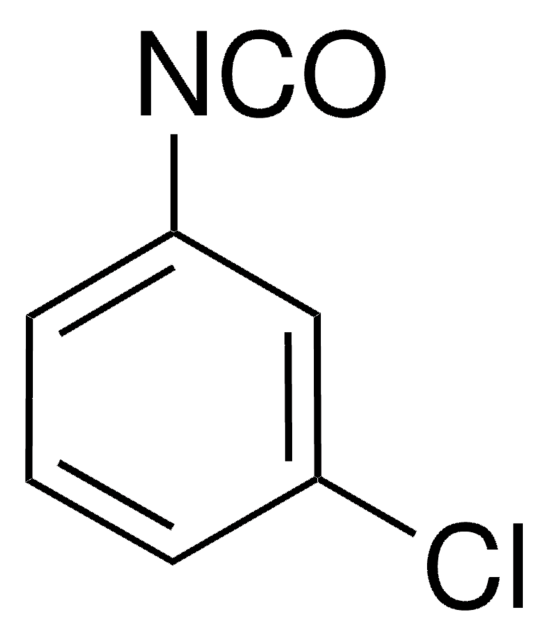374857
3,5-Bis(trifluoromethyl)phenyl isocyanate
98%
Sinónimos:
1-Isocyanato-3,5-bis(trifluoromethyl)benzene, 3,5-Di(trifluoromethyl)phenyl isocyanate
About This Item
Productos recomendados
Quality Level
assay
98%
form
liquid
refractive index
n20/D 1.43 (lit.)
density
1.476 g/mL at 25 °C (lit.)
functional group
fluoro
isocyanate
SMILES string
FC(F)(F)c1cc(cc(c1)C(F)(F)F)N=C=O
InChI
1S/C9H3F6NO/c10-8(11,12)5-1-6(9(13,14)15)3-7(2-5)16-4-17/h1-3H
InChI key
NRSSOFNMWSJECS-UHFFFAOYSA-N
Application
- Chemical derivatization of amino-functionalized model surfaces.
- Preparation of arylaminothiocarbonylpyridinium zwitterionic salts, via an exothermic reaction with 4-pyrrolidinopyridine.
- Synthesis of (S)-3-hydroxymethyl-2-methoxymethoxy-2′-(3-(3,5-bis(trifluoromethyl)phenyl)uryl-benzyl)-1,10-binaphthalene.
- Synthesis of 1-[3,5-bis(trifluoromethyl) phenyl]-3-(2-pyridyl)thiourea, via reaction with 2-amino pyridine in MeCN.
signalword
Danger
Hazard Classifications
Acute Tox. 4 Dermal - Acute Tox. 4 Inhalation - Acute Tox. 4 Oral - Eye Irrit. 2 - Resp. Sens. 1 - Skin Irrit. 2 - Skin Sens. 1 - STOT SE 3
target_organs
Respiratory system
Storage Class
6.1C - Combustible acute toxic Cat.3 / toxic compounds or compounds which causing chronic effects
wgk_germany
WGK 3
flash_point_f
154.4 °F - closed cup
flash_point_c
68 °C - closed cup
ppe
Eyeshields, Faceshields, Gloves, type ABEK (EN14387) respirator filter
Elija entre una de las versiones más recientes:
¿Ya tiene este producto?
Encuentre la documentación para los productos que ha comprado recientemente en la Biblioteca de documentos.
Los clientes también vieron
Nuestro equipo de científicos tiene experiencia en todas las áreas de investigación: Ciencias de la vida, Ciencia de los materiales, Síntesis química, Cromatografía, Analítica y muchas otras.
Póngase en contacto con el Servicio técnico













![1-[3,5-bis(trifluoromethyl)phenyl]-3-[(1R,2R)-(-)-2-(dimethylamino)cyclohexyl]thiourea AldrichCPR](/deepweb/assets/sigmaaldrich/product/structures/236/021/d944889d-2233-4700-9f2c-caa3652d0124/640/d944889d-2233-4700-9f2c-caa3652d0124.png)
![(R)-N-[(1R,2R)-2-(3-(3,5-Bis(trifluoromethyl)phenyl)ureido)cyclohexyl]-tert-butyl-sulfinamide 96%](/deepweb/assets/sigmaaldrich/product/structures/389/070/18847164-c6a7-4b4e-abcb-2dbc22493a2d/640/18847164-c6a7-4b4e-abcb-2dbc22493a2d.png)